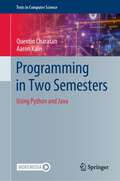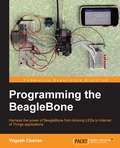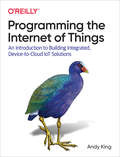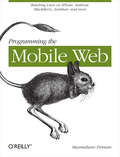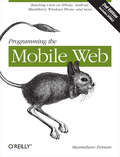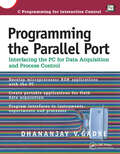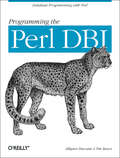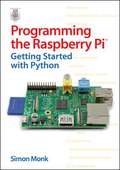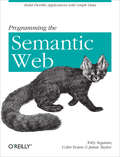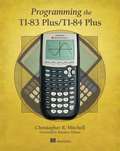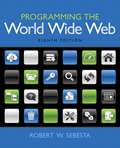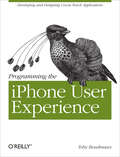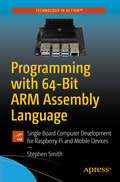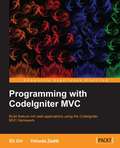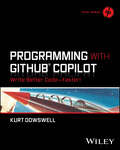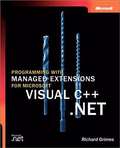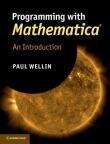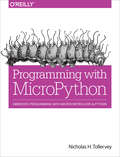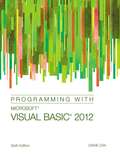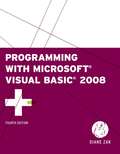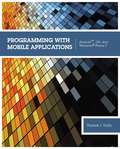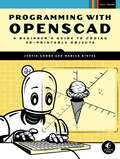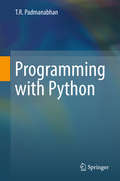- Table View
- List View
Programming in Two Semesters: Using Python and Java (Texts in Computer Science)
by Quentin Charatan Aaron KansThis highly accessible textbook teaches programming from first principles. In common with many programming courses, it uses Python as the introductory programming language before going on to use Java as the vehicle for more advanced programming concepts. The first part, which teaches Python, covers fundamental programming concepts, such as data types and control structures and functions. It introduces more complex data types such as lists and dictionaries and also deals with file handling. It introduces object-oriented concepts and ends with a case study bringing together all the topics of the first semester. The second part uses Java to teach advanced concepts and centres around object-oriented programming, teaching key object-oriented concepts such as inheritance and polymorphism. The semester again ends with an advanced case study bringing together all the topics of the second semester. Topics and features: Assumes no prior knowledge, and makes the transition from Python to Java a smooth process Features numerous exercises and also an illustrative case study for each language Examines procedural and object-oriented methodologies, as well as design principles Covers such advanced topics as interfaces and lambda expressions, exceptions and Collections Includes a chapter on graphics programming in Python using Tkinter Introduces the latest Java technology for graphical interfaces, JavaFX Explains design concepts using UML notation Offering a gentle introduction to the field and assuming no prerequisite background, Programming in Two Semesters is the ideal companion to undergraduate modules in software development or programming. In addition, it will serve as a strong primer for professionals looking to strengthen their knowledge of programming with these languages.
Programming in Visual Basic 2010
by Jim MckeownThis is an introduction to programming using Microsoft's Visual Basic. NET 2010, intended for novice programmers with little or no programming experience or no experience with Visual Basic. The text emphasizes programming logic and good programming techniques with generous explanations of programming concepts written from a non-technical point of view. It stresses input, processing, and output and sequence, selection, and repetition in code development. File I/O and arrays are included. Later chapters introduce objects, event programming, and databases. By taking a slow and steady approach to programming ideas, this book builds new concepts from what the reader has already learned. VB tips and quips inject both humor and insight. The book includes numerous programming examples and exercises, case studies, tutorials, and "fixing a program" sections for an in-depth look at programming problems and tools. Quizzes and review questions throughout each chapter get students to think about the materials and how to use them. Each chapter has a summary and glossary for extra review. The accompanying Web site, www.cambridge.org/us/McKeown, has code downloads, I/O, and database files from small, simple files to large files with thousands of records, flowcharts, deskchecks and audits to aid with program design, coding, and debugging; PowerPoint files for every chapter; and hundreds of ideas for programs and projects.<P> Advisory: Bookshare has learned that this book offers only partial accessibility. We have kept it in the collection because it is useful for some of our members. To explore further access options with us, please contact us through the Book Quality link on the right sidebar. Benetech is actively working on projects to improve accessibility issues such as these.
Programming the BeagleBone
by Yogesh ChavanMaster BeagleBone programming by doing simple electronics and Internet of Things projects About This Book * Quickly develop electronics projects that interact with Internet applications using JavaScript and Python * Learn about electronics components such as sensors and motors, and how to communicate with them by writing programs * A step-by-step guide to explore the exciting world of BeagleBone--from connecting BeagleBone to doing electronics projects and creating IoT applications Who This Book Is For If you want to learn programming on embedded systems with BeagleBone by doing simple electronics projects, this book is for you. This book is also helpful to BeagleBone owners who want to quickly implement small-scale home automation solutions. It is assumed that you have familiarity with C and Python programming. Some familiarity with electronics is helpful but not essential. What You Will Learn * Connect your BeagleBone to a computer in different ways and get the Cloud9 IDE running to quick-start programming on the BeagleBone * Get to know about BeagleBone extension pins such as GPIO and how to connect various electronics components with BeagleBone * Read and write to various electronics components such as LED, Push-button, sensors, and motors * Grasp in-depth theory on Analog, PWM, and BUS programming and the electronics components used in programs * Handle data to and from various BUS supporting modules such as UART, I2C, and SPI using the Adafruit BBIO Python library * Write real-life IoT applications in JavaScript and Python such as shooting an e-mail on overheat and controlling a servo motor remotely * Make use of online free cloud services to store and analyze sensor data collected on the BeagleBone * Discover what else can be done using the BeagleBone * Get to grips with embedded system BUS communication In Detail The whole world is moving from desktop computers to smartphones and embedded systems. We are moving towards utilizing Internet of Things (IoT). An exponential rise in the demand for embedded systems and programming in the last few years is driving programmers to use embedded development boards such as Beaglebone. BeagleBone is an ultra-small, cost-effective computer that comes with a powerful hardware. It runs a full-fledged Debian Linux OS and provides numerous electronics solutions. BeagleBone is open source and comes with an Ethernet port, which allows you to deploy IoT projects without any additions to the board. It provides plenty of GPIO, Anlaog pins, and UART, I2C, SPI pins which makes it the right choice to perform electronics projects. This gives you all the benefits of Linux kernel such as multitasking, multiusers, and extensive device driver support. This allows you to do programming in many languages including high-level languages such as JavaScript and Python. This book aims to exploit the hardware and software capabilities of BeagleBone to create real-life electronics and IoT applications quickly. It is divided into two parts. The first part covers JavaScript programs. The second part provides electronics projects and IoT applications in Python. First, you will learn to use BeagleBone as tool to write useful applications on embedded systems. Starting with the basics needed to set up BeagleBone and the Cloud9 IDE, this book covers interfacing with various electronics components via simple programs. The electronics theory related to these components is then explained in depth before you use them in a program. Finally, the book helps you create some real-life IoT applications. Style and approach An easy-to-follow guide full of real-world electronics programs and quick troubleshooting tips using BeagleBone. All the required electronics concepts are explained in detail before using them in a program and all programs are explained in depth. Most of the theory is covered in the first part; while the second part gives you some quick programs.
Programming the Internet of Things: An Introduction To Building Integrated, Device-to-cloud Iot Solutions
by Andy KingLearn how to program the Internet of Things with this hands-on guide. By breaking down IoT programming complexities in step-by-step, building-block fashion, author and educator Andy King shows you how to design and build your own full-stack, end-to-end IoT solution--from device to cloud. This practical book walks you through tooling, development environment setup, solution design, and implementation.You'll learn how a typical IoT ecosystem works, as well as how to tackle integration challenges that crop up when implementing your own IoT solution. Whether you're an engineering student learning the basics of the IoT, a tech-savvy executive looking to better understand the nuances of IoT technology stacks, or a programmer building your own smart house solution, this practical book will help you get started.Design an end-to-end solution that implements an IoT use caseSet up an IoT-centric development and testing environmentOrganize your software design by creating abstractions in Python and JavaUse MQTT, CoAP, and other protocols to connect IoT devices and servicesCreate a custom JSON-based data format that's consumable across a range of platforms and servicesUse cloud services to support your IoT ecosystem and provide business value for stakeholders
Programming the Mobile Web
by Maximiliano FirtmanToday's market for mobile apps goes beyond the iPhone to include BlackBerry, Nokia, Windows Phone, and smartphones powered by Android, webOS, and other platforms. If you're an experienced web developer, this book shows you how to build a standard app core that you can extend to work with specific devices. You'll learn the particulars and pitfalls of building mobile apps with HTML, CSS, and other standard web tools.You'll also explore platform variations, finicky mobile browsers, Ajax design patterns for mobile, and much more. Before you know it, you'll be able to create mashups using Web 2.0 APIs in apps for the App Store, App World, OVI Store, Android Market, and other online retailers.Learn how to use your existing web skills to move into mobile developmentDiscover key differences in mobile app design and navigation, including touch devicesUse HTML, CSS, JavaScript, and Ajax to create effective user interfaces in the mobile environmentLearn about technologies such as HTML5, XHTML MP, and WebKit extensionsUnderstand variations of platforms such as Symbian, BlackBerry, webOS, Bada, Android, and iOS for iPhone and iPadBypass the browser to create offline apps and widgets using web technologies
Programming the Mobile Web: Reaching Users on iPhone, Android, BlackBerry, Windows Phone, and more
by Maximiliano FirtmanWith the second edition of this popular book, you’ll learn how to build HTML5 and CSS3-based apps that access geolocation, accelerometer, multi-touch screens, offline storage, and other features in today’s smartphones, tablets, and feature phones. The market for mobile apps continues to evolve at a breakneck pace, and this book is the most complete reference available for the mobile web.Author and mobile development expert Maximiliano Firtman shows you how to develop a standard app core that you can extend to work with specific devices. This updated edition covers many recent advances in mobile development, including responsive web design techniques, offline storage, mobile design patterns, and new mobile browsers, platforms, and hardware APIs.Learn the particulars and pitfalls of building mobile websites and apps with HTML5, CSS, JavaScript and responsive techniquesCreate effective user interfaces for touch devices and different resolution displaysUnderstand variations among iOS, Android, Windows Phone, BlackBerry, Firefox OS, and other mobile platformsBypass the browser to create native web apps, ebooks, and PhoneGap applicationsBuild apps for browsers and online retailers such as the App Store, Google Play Store, Windows Store, and App World
Programming the Parallel Port: Interfacing the PC for Data Acquisition and Process Control
by Dhananjay GadreWhy purchase expensive add-on cards or bus interfaces when you can develop effective and economical data acquisition and process controls using C programs? Using the under-employed printer adapter (that is, the parallel port of your PC), you can turn your computer into a powerful tool for developing microprocessor applications. Learn how to build a
Programming the Perl DBI: Database programming with Perl
by Tim Bunce Alligator DescartesOne of the greatest strengths of the Perl programming language is its ability to manipulate large amounts of data. Database programming is therefore a natural fit for Perl, not only for business applications but also for CGI-based web and intranet applications.The primary interface for database programming in Perl is DBI. DBI is a database-independent package that provides a consistent set of routines regardless of what database product you use--Oracle, Sybase, Ingres, Informix, you name it. The design of DBI is to separate the actual database drivers (DBDs) from the programmer's API, so any DBI program can work with any database, or even with multiple databases by different vendors simultaneously.Programming the Perl DBI is coauthored by Alligator Descartes, one of the most active members of the DBI community, and by Tim Bunce, the inventor of DBI. For the uninitiated, the book explains the architecture of DBI and shows you how to write DBI-based programs. For the experienced DBI dabbler, this book reveals DBI's nuances and the peculiarities of each individual DBD.The book includes:An introduction to DBI and its designHow to construct queries and bind parametersWorking with database, driver, and statement handlesDebugging techniquesCoverage of each existing DBDA complete reference to DBIThis is the definitive book for database programming in Perl.
Programming the Raspberry Pi: Getting Started with Python
by Simon Monk<P>The Raspberry Pi is rapidly becoming a worldwide phenomena.<P> People are waking up to the possibility of a $35 (U.S.) computer that can be put to use in all sorts of settings--from a desktop workstation to a media center to a controller for a home automation system.
Programming the Semantic Web: Build Flexible Applications with Graph Data
by Toby Segaran Colin Evans Jamie TaylorWith this book, the promise of the Semantic Web -- in which machines can find, share, and combine data on the Web -- is not just a technical possibility, but a practical reality Programming the Semantic Web demonstrates several ways to implement semantic web applications, using current and emerging standards and technologies. You'll learn how to incorporate existing data sources into semantically aware applications and publish rich semantic data.Each chapter walks you through a single piece of semantic technology and explains how you can use it to solve real problems. Whether you're writing a simple mashup or maintaining a high-performance enterprise solution,Programming the Semantic Web provides a standard, flexible approach for integrating and future-proofing systems and data.This book will help you:Learn how the Semantic Web allows new and unexpected uses of data to emergeUnderstand how semantic technologies promote data portability with a simple, abstract model for knowledge representationBecome familiar with semantic standards, such as the Resource Description Framework (RDF) and the Web Ontology Language (OWL)Make use of semantic programming techniques to both enrich and simplify current web applications
Programming the TI-83 Plus/TI-84 Plus
by Christopher MitchellSummaryProgramming the TI-83 Plus/TI-84 Plus is an example-filled, hands-on tutorial that introduces students, teachers, and professional users to programming with the TI-83 Plus and TI-84 Plus graphing calculators. This fun and easy-to-read book immediately immerses you in your first programs and guides you concept-by-concept, example-by-example. You'll learn to think like a programmer as you use the TI-BASIC language to design and write your own utilities, games, and math programs. About the TechnologyThe TI-83 Plus and TI-84 Plus are more than just powerful graphing calculatorst—they are the perfect place to start learning to program. The TI-BASIC language is built in, so you have everything you need to create your own math and science programs, utilities—even games.About the BookProgramming the TI-83 Plus/TI-84 Plus teaches universal programming concepts and makes it easy for students, teachers, and professionals to write programs for the world's most popular graphing calculators. This friendly tutorial guides you concept-by-concept, immediately immersing you in your first programs. It introduces TI-BASIC and z80 assembly, teaches you tricks to slim down and speed up your programs, and gives you a solid conceptual base to explore other programming languages.This book is written for beginners—no programming backgroundis assumed. Purchase of the print book comes with an offer of a free PDF, ePub, and Kindle eBook from Manning. Also available is all code from the book. What's InsideWorks with all models of the TI-83, TI-83+, and TI-84+Learn to think like a programmerLearn concepts you can apply to any languageAdvanced concepts such as hybrid BASIC and ASMTable of ContentsPART 1 GETTING STARTED WITH PROGRAMMINGDiving into calculator programmingCommunication: basic input and outputConditionals and Boolean logicControl structuresTheory interlude: problem solving and debuggingPART 2 BECOMING A TI-BASIC MASTERAdvanced input and eventsPixels and the graphscreenGraphs, shapes, and pointsManipulating numbers and data typesPART 3 ADVANCED CONCEPTS; WHAT'S NEXTOptimizing TI-BASIC programsUsing hybrid TI-BASIC librariesIntroducing z80 assemblyNow what? Expanding your programming horizons
Programming the World Wide Web (Eighth Edition )
by Robert W. SebestaProgramming the World Wide Web is intended for undergraduate students who have completed a course in object-oriented programming. It also serves as an up-to-date reference for Web programming professionals. Programming the World Wide Web provides a comprehensive introduction to the tools and skills required for both client- and server-side programming, teaching students how to develop platform-independent sites using the most current Web development technology.
Programming the iPhone User Experience: Developing and Designing Cocoa Touch Applications
by Toby BoudreauxApple's iPhone and iPod Touch not only feature the world's most powerful mobile operating system, they also usher in a new standard of human-computer interaction through gestural interfaces and multi-touch navigation. This book provides you with a hands-on, example-driven tour of UIKit, Apple's user interface toolkit, and includes common design patterns to help you create new iPhone and iPod Touch user experiences. Using Apple's Cocoa Touch framework, you'll learn how to build applications that respond in unique ways when users tap, slide, swipe, tilt, shake, or pinch the screen. Programming the iPhone User Experience is a perfect companion to Apple's Human Interface Guidelines, and provides the practical information you need to develop innovative applications for the iPhone and iPod Touch, whether you're a CTO, developer, or UI/UX designer.Understand the basics of the Cocoa Touch framework for building iPhone and iPod Touch applications Learn theory and best practices for using Cocoa Touch to develop applications with engaging and effective user interfaces Apply your knowledge of Objective-C to the iPhone/iPod Touch framework Customize standard UIKit views according to Apple's Human Interface Guidelines and usability principles Learn patterns for handling user experience concerns outside of the interface, such as network- and location-awareness
Programming with 64-Bit ARM Assembly Language: Single Board Computer Development for Raspberry Pi and Mobile Devices
by Stephen SmithMastering ARM hardware architecture opens a world of programming for nearly all phones and tablets including the iPhone/iPad and most Android phones. It’s also the heart of many single board computers like the Raspberry Pi. Gain the skills required to dive into the fundamentals of the ARM hardware architecture with this book and start your own projects while you develop a working knowledge of assembly language for the ARM 64-bit processor.You'll review assembly language programming for the ARM Processor in 64-bit mode and write programs for a number of single board computers, including the Nvidia Jetson Nano and the Raspberry Pi (running 64-bit Linux). The book also discusses how to target assembly language programs for Apple iPhones and iPads along with 64-Bit ARM based Android phones and tablets. It covers all the tools you require, the basics of the ARM hardware architecture, all the groups of ARM 64-Bit Assembly instructions, and how data is stored in the computer’s memory. In addition, interface apps to hardware such as the Raspberry Pi’s GPIO ports. The book covers code optimization, as well as how to inter-operate with C and Python code. Readers will develop enough background to use the official ARM reference documentation for their own projects.With Programming with 64-Bit ARM Assembly Language as your guide you’ll study how to read, reverse engineer and hack machine code, then be able to apply these new skills to study code examples and take control of both your ARM devices’ hardware and software. What You'll LearnMake operating system calls from assembly language and include other software libraries in your projectsInterface apps to hardware devices such as the Raspberry Pi GPIO portsReverse engineer and hack codeUse the official ARM reference documentation for your own projectsWho This Book Is ForSoftware developers who have already learned to program in a higher-level language like Python, Java, C#, or even C and now wish to learn Assembly programming.
Programming with CodeIgniterMVC
by Yehuda Zadik Eli OrrThe book is written for PHP developers who wish to learn how to use MVC for application development, using CodeIgniter. No experience of CodeIgniter would be necessary, as this book is for beginning MVC development.This book is written for PHP developers who wish to learn how to use the CodeIgniterMVC framework for application development. No experience of CodeIgniteris necessary, as this book is for beginning MVC development.
Programming with GitHub Copilot: Write Better Code--Faster! (Tech Today)
by Kurt DowswellAccelerate your programming with the most popular AI coding tool on the market: GitHub Copilot In Programming with GitHub Copilot: Write Better Code — Faster, veteran software developer and GitHub community hero Kurt Dowswell delivers an insightful and hands-on exploration of GitHub's powerful, new AI coding assistant, Copilot. In the book, you'll discover how to use the tool's capabilities to push the boundaries of what you thought was possible in programming. Even if you've used autocomplete tools—like VS Code's TabNine extension—before, you'll be floored by GitHub Copilot's potential to transform the way you code. You'll learn how to install, configure, and use the software, from employing it's most common and widely used features to deploying business and enterprise functionality. You'll even discover how to fix runtime and compilation bugs and write unit, integration, and end-to-end tests. You'll also find: Prompt strategies to get GitHub Copilot to help you brainstorm new code solutions What the future looks like for AI-assisted coding, including discussions of issues like code licensing and ethics Directions for chatting with Copilot, including common commands and prompts to help you guide the conversation to where you want it to go Perfect for practicing programmers, developers, and software engineers, Programming with GitHub Copilot is also an essential resource for coders and other IT practitioners-in-training who want to expand their knowledge and improve the scope and depth of their programming skillsets.
Programming with Higher-Order Logic
by Dale Miller Gopalan NadathurFormal systems that describe computations over syntactic structures occur frequently in computer science. Logic programming provides a natural framework for encoding and animating such systems. However, these systems often embody variable binding, a notion that must be treated carefully at a computational level. This book aims to show that a programming language based on a simply typed version of higher-order logic provides an elegant, declarative means for providing such a treatment. Three broad topics are covered in pursuit of this goal. First, a proof-theoretic framework that supports a general view of logic programming is identified. Second, an actual language called λProlog is developed by applying this view to higher-order logic. Finally, a methodology for programming with specifications is exposed by showing how several computations over formal objects such as logical formulas, functional programs, and λ-terms and π-calculus expressions can be encoded in λProlog.
Programming with Managed Extensions for Microsoft® Visual C++® .NET
by Richard Grimes<div xmlns="http://www.w3.org/1999/xhtml"><p>This book thoroughly covers the Visual C++ managed extensions and how to write Microsoft .NET libraries and applications, plus features that are new to Visual C++.</p></div>
Programming with Mathematica®: An Introduction
by Paul WellinStarting from first principles, this book covers all of the foundational material needed to develop a clear understanding of the Mathematica language, with a practical emphasis on solving problems. Concrete examples throughout the text demonstrate how Mathematica language, can be used to solve problems in science, engineering, economics/finance, computational linguistics, geoscience, bioinformatics, and a range of other fields. The book will appeal to students, researchers and programmers wishing to further their understanding of Mathematica language. Designed to suit users of any ability, it assumes no formal knowledge of programming so it is ideal for self-study. Over 290 exercises are provided to challenge the reader's understanding of the material covered and these provide ample opportunity to practice using the language. Mathematica language notebooks containing examples, programs and solutions to exercises are available from www. cambridge. org/wellin.
Programming with MicroPython: Embedded Programming with Microcontrollers and Python
by Nicholas H. TollerveyIt’s an exciting time to get involved with MicroPython, the re-implementation of Python 3 for microcontrollers and embedded systems. This practical guide delivers the knowledge you need to roll up your sleeves and create exceptional embedded projects with this lean and efficient programming language. If you’re familiar with Python as a programmer, educator, or maker, you’re ready to learn—and have fun along the way.Author Nicholas Tollervey takes you on a journey from first steps to advanced projects. You’ll explore the types of devices that run MicroPython, and examine how the language uses and interacts with hardware to process input, connect to the outside world, communicate wirelessly, make sounds and music, and drive robotics projects.Work with MicroPython on four typical devices: PyBoard, the micro:bit, Adafruit’s Circuit Playground Express, and ESP8266/ESP32 boardsExplore a framework that helps you generate, evaluate, and evolve embedded projects that solve real problemsDive into practical MicroPython examples: visual feedback, input and sensing, GPIO, networking, sound and music, and roboticsLearn how idiomatic MicroPython helps you express a lot with the minimum of resourcesTake the next step by getting involved with the Python community
Programming with Microsoft Visual Basic 2012, 6th Edition
by Diane ZakPROGRAMMING WITH MICROSOFT VISUAL BASIC 2012, 6E by best-selling author Diane Zak is the ideal choice for your introduction to programming. Readers learn to master the basics of effective programming as they work through a wealth of hands-on applications in this book's engaging real-world setting. Numerous learning features address today's varied learning styles with an approachable visual presentation, helpful step-by-step tutorials, and engaging "You Do It" activity boxes. Even students with no prior programming experience learn how to effectively plan and create interactive Windows applications. This edition emphasizes GUI design skills and object-oriented programming concepts throughout.
Programming with Microsoft® Visual Basic® 2008
by Diane ZakProgramming with Microsoft Visual Basic 2008, Fourth Edition by the best-selling author, Diane Zak, is designed for a first course in programming. Using the most recent version of the software, Visual Basic 2008, this book teaches individuals how to use Visual Basic applications as they would in a real world setting. Students with no previous programming experience learn how to plan and create their own interactive windows applications. GUI design skills and Object-Oriented Programming concepts are emphasized throughout the book.
Programming with Mobile Applications: Android, iOS, and Windows® Phone 7
by Thomas J. DuffyDiscover how to create effective native apps across platforms and Web apps for today's most popular smartphone platforms with Duffy's PROGRAMMING MOBILE APPLICATIONS: ANDROID(tm), iOS, AND WINDOWS PHONE 7. This unique, hands-on tutorial approach combines clear presentations with numerous screenshots and step-by-step instructions to guide readers in developing applications for Google(tm) Android(tm), Apple iOS, and Windows Phone 7. Readers learn to create identical native and Web apps for each platform, which allows comparing each platform's development processes. The book's complete coverage ranges from platform architecture to native app life cycle management with an emphasis on fundamental programming concepts. This book's unique coverage of multiple platforms not only demonstrates the portability of apps that readers create, but also ensures an solid understanding of programming principles that benefits readers throughout any career.
Programming with OpenSCAD: A Beginner's Guide to Coding 3D-Printable Objects
by Justin Gohde Marius KintelProgramming with OpenSCAD is a STEM-focused, learn-to-code book for beginners that introduces core computational thinking concepts through the design of 3D-printable objects. Develop coding skills as you build increasingly complex 3D models and print them into fun games, puzzles, and more.OpenSCAD is freely available open source software that enables nondesigners to easily create 3D designs using a text-based programming language. It&’s a great language for beginners because the instant 3D visualization gives you immediate feedback on the results of your code. This book channels OpenSCAD&’s visual benefits and user-friendliness into a STEAM-focused, project-based tutorial that teaches the basics of coding, 3D printing, and computational thinking while you develop your spatial reasoning by creating 3D designs with OpenSCAD. Presuming no prior experience with either programming or 3D design, each chapter builds a scaffolded understanding of core concepts. You&’ll start by defining, drawing and displaying geometric primitives with text-based code, then expand your creative toolbox with transformation operations – like rotating, reflecting, scaling, and combining shapes. As the projects become more sophisticated, so will your programming skills; you&’ll use loops for replicating objects, if statements for differentiating your designs, and parameterized, self-contained modules to divide longer scripts into separate files. Along the way, you'll learn 3D printing tips so that you can produce physical mementos of your progress and get physical feedback that lets you correct mistakes in real time. In addition, the book provides hands-on and accessible design exercises at the end of each chapter so that you can practice applying new concepts immediately after they are introduced. You&’ll learn:Programming basics like working with variables, loops, conditional statements, and parameterized modulesTransformation operations, such as rotate, reflect, and scale, to create complex shapesExtrusion techniques for turning 2D shapes into elaborate 3D designsComputational-thinking concepts, including decomposition, abstraction, and pattern recognition OpenSCAD&’s Boolean, Minkowski and hull operations for combining multiple 3D shapes into one3D design fundamentals, like navigating the xyz-axis, orthogonal vs. perspective views, and constructive solid geometryOrganizing bigger designs into separate files to make code more readable and collaborative Accessibly written for a wide audience (advanced middle schoolers, high school students, college students, artists, makers and lifelong-learners alike), this is the perfect guide to becoming proficient at programming in general and 3D modeling in particular.
Programming with Python
by T R PadmanabhanBased on the latest version of the language, this book offers a self-contained, concise and coherent introduction to programming with Python. The book's primary focus is on realistic case study applications of Python. Each practical example is accompanied by a brief explanation of the problem-terminology and concepts, followed by necessary program development in Python using its constructs, and simulated testing. Given the open and participatory nature of development, Python has a variety of incorporated data structures, which has made it difficult to present it in a coherent manner. Further, some advanced concepts (super, yield, generator, decorator, etc. ) are not easy to explain. The book specially addresses these challenges; starting with a minimal subset of the core, it offers users a step-by-step guide to achieving proficiency.
